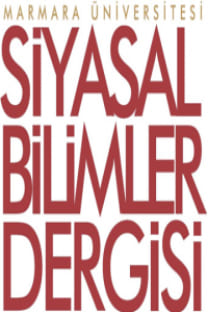Turkey’s Unique Energy Corridor Role at the Center of Eurasia in the 21st Century
Turkey, Energy Security, Eurasia, Energy Corridor, Russian Federation, Iran, Azerbaijan, Iraq, Eastern Mediterranean
___
- Abay, Emre G. (2016). Construction of Turkish Stream to begin in 2018- Agreement involves construction of 2 gas pipelines through the Black Sea. Anatolian Agency, October 11, 2016, http://aa.com.tr/en/ economy/construction-of-turkish-stream-to-begin-in-2018/662950 [Accessed 12 Oct. 2016]
- Barak, R. (2016). Israel and Turkey Officially Announce Rapprochement Deal, Ending Diplomatic Crisis. Haaretz, June 27, 2016, http://www.haaretz.com/israel-news/1.727369 [Accessed 17 Oct. 2016]
- Başboğa, M. (2016). Turkey, Russia Sign Turkish Stream Deal. Natural Gas World, October 11, 2016, http://www. naturalgasworld.com/turkey-and-russia-signs-turkish-stream-deal-after-rapprochement-32069 [Accessed 14 Oct. 2016]
- Cagatay, G. (2016). Azerbaijan Parliament approves TANAP project. AA English, September 30, 2016, http:// aa.com.tr/en/economy/azerbaijan-parliament-approves-tanap-project/656029 [Accessed 4 Oct. 2016]
- Caşın, Mesut H. and G.S. Derman (2016). Rus Dış Politikasındaki Değişim ve Kremlin Penceresinden Yeni Ufuklar, Ankara: SRT Yayınları.
- Caşın, Mesut H. (2015). Novgorod Knezliği’nden XXI. Yüzyıla Rus İmparatorluk Stratejisi, Ankara: Atlas Kitap.
- Daily Herald (2016). Turkey, Israel to consider building gas pipeline. Daily Herald. 13 October 2016.
- Daily Sabah (2016a). Turkey to Chair 2017 Energy Club of Shanghai Cooperation Organization. Daily Sabah. 23 November 2016.
- Daily Sabah (2016b). Gazprom receives license from Turkey to build under water of Turkish Stream. Daily Sabah Energy. 14 September 2016.
- Erkan, Hakan S., Kısacık, S. and D. Sevimli (2015). Türkiye’nin Komşuları Cilt-I: XV. Yüzyıldan XXI. Yüzyıla Türkiye-Azerbaycan İlişkileri ve Azerbaycan’ın Sosyal, Ekonomik, Kültürel Değişimi. İstanbul: Kanes Yayınları.
- Güney, N. A. (2015). Turkey’s Energy Security Strategy in the Emergent Global Energy Outlook. Insight Turkey, 17 (2): pp. 35-43.
- Hürriyet Daily News (2016). Turkey to assume Shanghai Cooperation Organization’s Energy Club term presidency. Hürriyet Daily News. 23 November 2016.
- Ibrahimov, R. (2015). Turkish-Azerbaijani Energy Relations: Significant Leverage in the Implementation of the Foreign Policy Interests of Both Countries. Insight Turkey, 17 (2): pp. 83-100.
- Kalehsar O. S. (2015). Iran Energy Sector: Post Sanctions. In H. Çomak, C. Sancaktar, and Z. Yıldırım eds., Enerji Diplomasisi, 1st ed. İstanbul: Beta Yayınları, pp. 411-440.
- Kısacık, S. , F. Kaya (2016). Türkiye-Rusya Federasyonu Arasındaki Mevcut Gerginliğin Avrupa Enerji Güvenliğine Olası Yansımaları Hakkında Bir Değerlendirme. In O. Örmeci, H. Işıksal eds., Mavi Elma: Türkiye-Avrupa İlişkileri, 1st ed. Ankara: Gazi Kitabevi, pp. 81-113.
- Kısacık, S. , F. Kaya (2015). Turkey’s Central Position in the Current Eurasian Energy Geopolitics. American Academic and Scholarly Research Journal 7 (3): pp. 33-72.
- Kısacık, S. (2014). 2000’li Yıllarda Gelişen Türkiye-İran Enerji İlişkileri. Uluslararası Politika Akademisi, March 16, 2014, http://politikaakademisi.org/2014/03/16/2000li-yillarda-gelisen-turkiye-iranenerji- iliskileri/ [18 Mar. 2017].
- Küçükcan, T. (2015). Türkiye ve Enerji Jeopolitiği. In Burak Küntay ed., Türk Dış Politikasında Stratejiler ve Yeni Yaklaşımlar, 1st ed. İstanbul: Bahçeşehir Üniversitesi Yayınları, pp.434-461.
- Latypov, E. (2014). The Southern Gas Corridor: a struggle between EU co-operation and Chinese dominance. Central Europe Energy Partners, 6 November 2014, http://www.ceep.be/southern-gas-corridor-euco- operation-chinese-dominance/ [Accessed 15 June 2016]
- Liebermann, Oren, and E. Labott (2016). Israel, Turkey strike deal to normalize ties. CNN International Edition, June 27, 2016, http://edition.cnn.com/2016/06/26/middleeast/israel-turkey-relations/ [Accessed 17 Oct.2016]
- Milliyet (2016). TBMM, Türk Akımı projesini onayladı. Milliyet. 2 December 2016.
- Presidency of the Republic of Turkey (2016). Turkish Stream Natural Gas Pipeline Project Signed, Ankara, 10 October 2016.
- President of Russia (2017). Law ratifying Russia-Turkey intergovernmental agreement on Turkish Stream pipeline project, Moscow, 7 February 2017.
- Roberts, J. (2016). Cyprus Split Blocks Use of Gas Reserves. Natural Gas Europe, May 18, 2016, http://www. naturalgaseurope.com/cyprus-29617 [Accessed 19 June 2016]
- Rosario, B. (2016). Critical KRG oil pipeline shut down due to sabotage. Al-Newsra, February 23, 2016, https://alnewsra.com/2016/02/23/kirkuk-ceyhan-oil-pipeline-sabotaged/ [Accessed 17 June 2016]
- Rudaw (2016). Baghdad won’t pump oil through Kirkuk-Ceyhan without revenue sharing deal with Erbil. Rudaw. 22 March 2016.
- Sengul, E. (2016). Russia wants to see Turkey as transit hub: Russian Amb.–Russia’s cooperation with Turkey prevails for construction of Akkuyu Nuclear Power Plant, Amb. Karlov says. Anadolu Agency Energy News Terminal, November 30, 2016,http://aaenergyterminal.com/news.php?newsid=10215125, [Accessed 3 Dec. 2016].
- Sputnik International (2017). Putin Signs Law on Ratifying Deal with Ankara on Turkish Stream Gas Pipeline. Sputnik International. 7 February 2017.
- Sputnik International (2016). Turkish Stream Pipe-Laying to Start in 2017, End in Late 2019. Sputnik International. 12 October 2016.
- The Moscow Times (2016). Turkish President Apologizes for Downing Russian Bomber. The Moscow Times. 27 June 2016.
- Tiftikçiğil, B. Y., and Ç. G. Yesevi (2015). Türkiye’nin Enerji Görünümü: Stratejiler ve İlişkiler. İstanbul: Derin Yayınları.
- T.C. Başbakanlık Kanunlar ve Kararlar Genel Müdürlüğü-Türkiye Büyük Millet Meclisi (2014). Türkiye Cumhuriyeti Hükümeti ile Azerbaycan Cumhuriyeti Hükümeti Arasında Trans Anadolu Doğal Gaz Boru Hattı Sistemine İlişkin Hükümetlerarası Anlaşmanın eki Türkiye Cumhuriyeti Hükümeti ve The Trans Anatolian Gas Pipeline Company B.V. Arasında Trans-Anadolu Doğal Gaz Boru Hattı Sistemi Hakkında Ev Sahibi Ülke Anlaşmasına İlişkin Değişikliğin Onaylanmasının Uygun Bulunduğuna Dair Kanun Tasarısı, Ankara, July 2014.
- TASS–Russian News Agency (2016). Erdogan signs bill to ratify Turkish Stream project. TASS–Russian News Agency. 6 December 2016.
- TASS–Russian News Agency (2015). Turkish Stream pipeline construction project suspended—Russia’s Energy Minister. TASS–Russian News Agency. 3 December 2015.
- Vestnik Kavkaza (2016). Erdogan: Turkish Stream to be financed on 50-50 basis by Turkey and Russia. Vestnik Kavkaza. 11 August 2016.
- Yayın Aralığı: 2
- Başlangıç: 2013
- Yayıncı: Marmara Üniversitesi
The Red-Bull Effect: Causes and Consequences of Overconfidence in Foreign Policy Decision Making
Economic Regionalization and Black Sea in a Comparative Perspective
Hazar Bölgesinde Rusya ve AB Ekonomi-Politik Çekişmesi ve “Ukrayna” Faktörü
Emel PARLAR DAL, Ali Murat KURŞUN
Turkey’s Unique Energy Corridor Role at the Center of Eurasia in the 21st Century
Küresel Yönetişim Ekseninde Stratejik Planlarda Koordinasyonun Önemi
Ömer Faruk GENÇKAYA, Hakan Gökhan GÜNDOĞDU
Black Sea Synergy: Success or Failure for the European Union?
Kuruluşundan Günümüze Karadeniz Ekonomik İşbirliği Örgütü
NATO ve Rusya Federasyonu’nun Yeni Mücadele Alanı: Karadeniz
